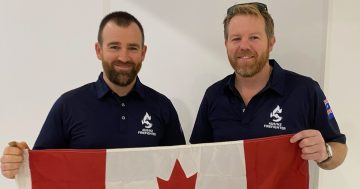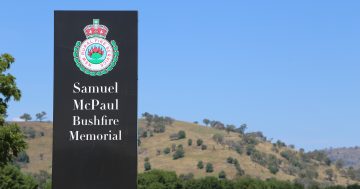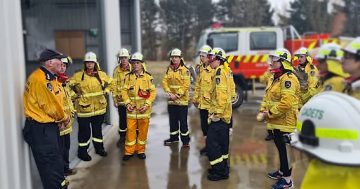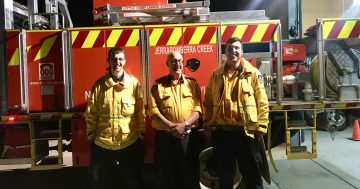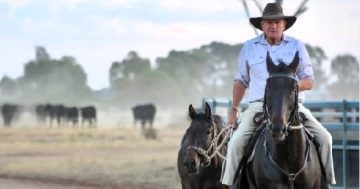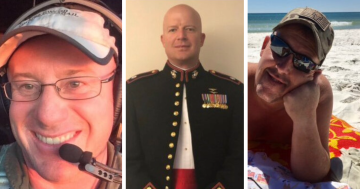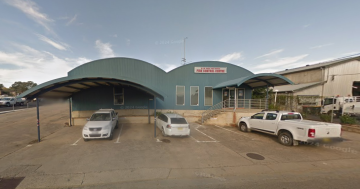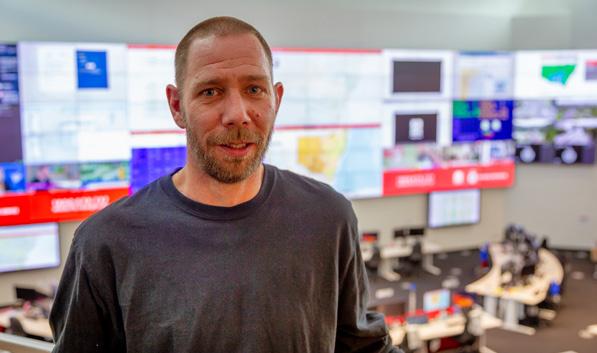
Canadian Kevin Parkinson was amazed by the local and state volunteer fire service during the 2019-2020 Black Summer bushfires. Photo: Supplied by NSW Rural Fire Service.
When Kevin Parkinson flew to Australia to assist with the Black Summer bushfires, he didn’t think he’d be calling the country home 12 months later.
However, it didn’t take long for the Canadian firefighter to convince his wife and children to move to the NSW South Coast after showing them photos and sharing stories of how amazing the locals were and how supportive the NSW Rural Fire Service was.
“It also helps that the Canadian and Australian cultures are similar, and the weather is a lot better in Australia,” says Kevin. “It doesn’t get down to minus-40 or four feet of snow like it does during winter in northern Alberta.”
Kevin became a firefighter straight out of school, in 1994, and his wife has stuck by his side during many deployments and 26 years of tackling wildfires.
“My wife fully supports me and my career,” he says. “She’s been with me almost since I started so she’s pretty used to me going away to fires. She was proud and happy I came down and assisted the country.”
Kevin was one of 34 Alberta staff chosen to assist Australia in its time of need and he considers himself lucky for that reason.
“I felt lucky I was able to provide my assistance and my experience,” he says.
“During the years, Australia has come to Canada numerous times to assist us and so in your time of need, the call came up for assistance.”
Kevin spent his 31-day deployment based in the Moruya Fire Control Centre as an operations officer.
That meant he was responsible for coordinating resources for six fires, from Batemans Bay to the Victorian border – an area about 6000 hectares in size.
Kevin says those fires were among the most intense he’s ever seen.
“The fire behaviour was unprecedented,” he says. “You guys had some pretty severe fire seasons prior to this, but with so much dry feed the fire behaviour was pretty intense.
“We get the same back in Canada, but one of the big differences is the spotting you guys have down here.
“Back home, a 2km spot fire would be pretty impressive, whereas down here it’s not very impressive.”
After convincing his wife and kids to move Down Under, Kevin applied for a job with the NSW Rural Fire Service and was successful.
Now he’s the planning and fire behaviour officer with NSW Rural Fire Service Area Southern Eastern, but getting back to Australia wasn’t easy.
Kevin and his wife have six children, but most of them are adults so only two came with them to Australia.
However, COVID-19 had just hit and it was impossible to secure seats on flights so Kevin decided to come alone to begin with.
“I landed on Christmas Day and did two weeks quarantine by myself,” he says. “Then my wife and two kids were meant to fly out on 1 February, but due to flight capacity restrictions, their flights got cancelled.”
The next available flights for Kevin’s wife and two children were in March. After arriving, they also had to spend two weeks in hotel quarantine, but Kevin says it was worth it.
“We’re renting a property in Catalina [near Batemans Bay] and everything’s going really well,” he says.
“Everyone is super friendly, the community and town are great, the scenery is beautiful and I’ve received tonnes of support from everyone I work with, from the local office to the headquarters.
“My family is settling in, too. The kids are making friends at school and my wife has got a new part-time job so it’s starting to become home now.”
Kevin hopes to use his experience as a Rapattack initial attack firefighter, a wildlife ranger, wildfire technologist and operations officer to prepare Australia for its next hour of need.
Although let’s hope that’s some time away.
“Even though there are different fuel types here, fires still work the same way so having a broad understanding of fires back home, and my experience of fairly multiple roles on management teams and specialised positions, I feel I have a lot to share.”







